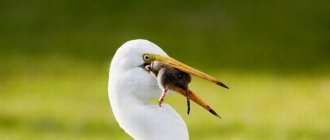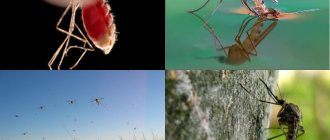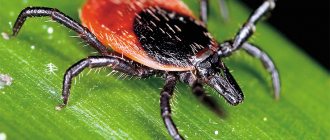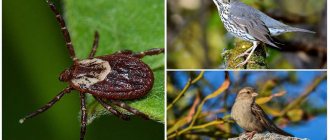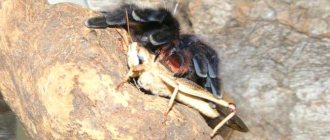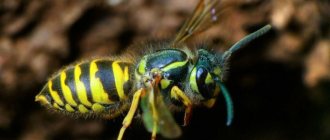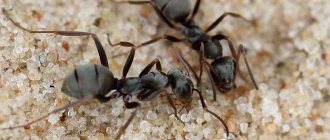The benefits and harms of a wasp are related to its food preferences and lifestyle. Unlike bees, humans do not like insects because of their aggressive nature, painful bites, and wrecking in their summer cottage. But the role of wasps in nature is extremely important. The wasp family is not limited to the striped yellow and black individuals that are well known to rural and urban residents. There is a huge variety, differing in lifestyle, behavior, and strength of poison.
The role of wasps in nature
There are about 1,000 species of wasps in the world. All this diversity can be divided into 2 main groups:
- single;
- public.
As the name implies, solitary insects exist on their own, while social insects unite into large families, which number up to 2-3 thousand individuals.
Public
No matter what category wasps belong to, they are an important part of the ecosystem. So, what benefits do wasps bring in nature:
- are considered one of the best natural orderlies, as they feed on carrion, accelerating its decomposition;
- participate in plant pollination;
- are predators that hunt many insects, regulating their numbers.
Of course, wasps do not purposefully hunt only pests, so they often destroy beneficial insects as well.
Do wasps pollinate plants?
One of the factors that determines the benefit of wasps in nature is that insects pollinate plants. The body of a wasp is not covered with villi, like a bee or a fly, so it does not carry as much pollen. In addition, these insects do not specifically engage in pollination. However, when wasps land on flowers to snack on nectar, they can become dirty with pollen, and when they fly to another plant, they unwittingly pollinate it.
Destruction of small insects
Regulating the number of insects that destroy agricultural crops and wild plants is what wasps are needed for in nature. The main diet of adults consists of fruit juices and flower nectar. But larvae need protein for growth and development. To provide the younger generation with enough nutrients, wasps hunt insects and arachnids, including:
- flies;
- mosquitoes;
- aphid;
- beetles;
- bedbugs;
- spiders;
- caterpillars, etc.
The wasps inject poison into the victim, and then bring the chewed flies and caterpillars to the larvae.
The benefit of wasps for humans is that they destroy many pests that cause serious damage to gardens and vegetable gardens, for example, cutworms, chafer larvae, thrips, and leaf beetles. Also, the benefit of wasps is a significant reduction in the population of flies that carry dirt and cause dangerous diseases.
Consequences of disappearance
Each insect has its own function in nature. Its disappearance will certainly lead to an imbalance. Being predators, wasps regulate the number of other insects, successfully destroying them. This way the natural balance is maintained.
Indirectly, they are protectors of insects with a color similar to aspen. The striped colors of harmless beetles and butterflies allow them to avoid encounters with predators that avoid those who look like wasps with a stern disposition.
Why don't people like wasps?
People's negative attitude towards wasps has developed over the centuries. It is not so easy to notice the benefits of these insects, but it is impossible not to pay attention to a painful bite or spoiled berries on the plot.
Spoiled Harvest
Adult wasps feed on nectar of flowers, juice of ripe fruits and berries. Insects prefer sweet fruits. Their priority is grapes, apricots, peaches, pears, plums, and raspberries.
With strong mandibles, the insect easily bites through the thin skin of the fruit and drinks the juice. Not only does it spoil the presentation of fruits and berries. Due to the damaged skin, the fruits begin to rot, and the unprotected sweet pulp attracts fruit flies and ants, which finish what the wasps started. As a result, the amount of crop available for harvesting and further use is significantly reduced.
Bites
Despite the fact that wasps are considered quite aggressive insects, they rarely attack people first. But if the insect feels threatened, for example, a person approaches it, waving his arms, it attacks.
Bite
A wasp sting is very painful. And the point is not only that the insect pierces the skin with a sharp ovipositor without any anesthesia. At the moment of the bite, poison produced by a special gland enters the wound. The chemical composition of the toxin varies depending on the type of wasp, but not a single bite goes unnoticed for a person.
Wasps and bees
Sweet-toothed wasps are attracted to the aroma of honey, so they are frequent but unwanted guests in apiaries. Insects enter the hives and destroy them by eating the reserves. The bees try to defend themselves, and the strong family manages to drive away the invaders. But a weak family may not be able to cope; a large number of honey plants die in the battle. The wasps feed the larvae with the bodies of dead bees.
Small insect exterminators
Adults feed on nectar and fruit extract. But the larvae need constant replenishment of protein. To do this, wasps prey on other insects, including flies, mosquitoes, spiders, aphids, and garden pests.
A flexible body structure, powerful jaws, a sting equipped with poison - nature generously endowed the “minke whales” with all this for a reason. Thanks to this arsenal, they can sting the enemy from almost any angle. They deal with small, weak opponents with the help of mandibles, crushing the skull or chitinous cover into small pieces.
Scientists, answering the question of what wasps are for, say that without them, a person would simply be horrified by the number of insects that exist in nature. First of all, this applies to flies, midges, beetles and spiders.
Helpers in personal plots
Wasps play a significant role in nature by destroying garden pests. For example, the burrowing single Larra wasp helps in destroying a dangerous pest - the mole cricket. She is absolutely indifferent to other insects and animals.
But slender insects help fight not only mole crickets. Giant scolia, in addition to pollinating flowers, regulate the number of bronze beetles, beetles, and rhinoceros beetles. Like the Larra wasp, Scolia lays eggs on its prey.
Tiny Spilomena troglodytes wasps destroy thrips. Other species with amazing diligence catch caterpillars of moths, leaf rollers, leaf beetles, bugs, cicadas, weevils, and horse flies.
We must not forget that the functions of wasps in nature include pollination of plants and flowers, which is important for their development and reproduction.
Wasp and man
Given the aggressive nature and painful stings of wasps, many people are wary of them. However, there is no denying the fact that wasps can be beneficial. Research is regularly conducted to find out what else wasps can do for people.
What attracts wasps to humans?
There are several factors that attract wasps to summer cottages or even to a person’s home. These include:
- aroma of ripe fruits;
- the smell of jam, compotes, sweets;
- smell of food waste.
Wasps do not like some smells, but do not scare them away, but provoke an attack. These smells are produced by:
- sickly sweet perfume;
- sweat;
- some deodorants.
Insect aggression can be caused by black, bright colors, and long flowing hair. But the smell of its own poison is extremely attractive to predators. So, if a person is bitten by a wasp, its relatives may be drawn to him.
Danger to humans
The main and rather serious danger to humans is the substance that the insect injects into the blood at the time of the bite. After it, the following symptoms may be observed:
- pain, burning, itching in the affected area;
- skin redness;
- edema;
- cardiopalmus.
The poison is a strong allergen, so a reaction develops even in people who are not prone to allergies. For allergy sufferers, the situation can be much more serious. In severe cases, the bitten person exhibits:
- temperature increase;
- nausea, vomiting;
- weakness, dizziness;
- convulsions;
- fainting;
- Quincke's edema.
Edema
Sometimes a person develops anaphylactic shock after being bitten.
Application in medicine
Modern research proves that the venom of some wasp species is a unique substance that interacts with cancer cells, destroying them. Perhaps over time, scientists will be able to create a medicine based on this substance that can be used to treat cancer.
Traditional healers claim that wasp nests are beneficial. They are crushed and an alcohol infusion is prepared based on the resulting powder. It helps in the treatment of pathologies of joints and bones. A decoction of the powder normalizes the functioning of the gastrointestinal tract. Baths containing crushed wasp nests are also beneficial. They invigorate and improve muscle tone.
Important purpose
Social wasps are predators that control the numbers of potential pest insects such as aphids and many caterpillars.
It is estimated that social bees in the UK alone kill 14 million kg of insects per summer.
Wasps are also valuable pollinators, carrying pollen by visiting flowers to drink nectar.
image copyrightGetty Images
A new study will take advantage of wasps' love of sweet liquids to learn more about these amazing and underappreciated insects. Scientists ask people to make simple traps from a drinking bottle and a few drops of beer.
Researchers from University College London and the University of Gloucestershire want to collect and study the contents of these beer traps. The aim of the project is to find out what species of wasps live in the UK in order to conserve them.
Wasps are having a hard time right now; The changing environment, climate, habitat loss and insecticide use are negatively impacting the lives of these important insects.
Source
Useful tips
It is impossible to guarantee the protection of a personal plot from the appearance of wasps, and given the benefits that these insects bring, it is not reasonable. But it’s worth thinking about protecting ripening sweet fruits from insects in advance. To do this, pears, peaches, and bunches of grapes are covered with netting or other material. The process is labor-intensive and time-consuming, but the harvest will remain intact and you will not have to use toxic insecticides.
If there are too many wasps on the site and you still decide to get rid of them, you should not immediately use chemicals. It is more advisable to try using safer means, for example, using traps (you can make your own).
It has been noticed that wasps do not take root where there are already other people’s nests. And since insects are not very picky, a structure vaguely similar to it can be used as a false nest.
Social types
Colonial and hive-building species are just a small part of the species diversity of wasps. Most wasps are solitary, some of them are very tiny (some are almost microscopic), they never bother people and no one ever notices them.
Social wasp hives are built from wood fiber mixed with water. The result is something like papier-mâché, from which very strong and durable structures can be made. Hives begin to be built in late spring, when the queens awaken from hibernation.
The queen herself builds a small nest of just a few cells and hatches the first batch of workers. When the workers grow up, they also begin to work for the benefit of the developing colony.
image copyrightGetty Images
Social wasp hives are built from wood fiber mixed with water.
Worker wasps work tirelessly to raise their sisters from the eggs the queen lays, collaborating and communicating to build and defend the nest, gather food, and care for the queen. When the colony becomes large enough, the workers begin to feed some of the young larvae more and more often than usual, causing the genetic changes necessary for the development of a potential queen.
Male wasps, which do not participate in the social life of the colony, emerge from unfertilized eggs in a form of sex determination called haplodiploidy.
Potential queens and males are the reproductive future of the colony. After mating with males from other colonies, the queens overwinter and establish their own colony in the spring.
Wasps do not produce honey, but are nonetheless important to the environment.
